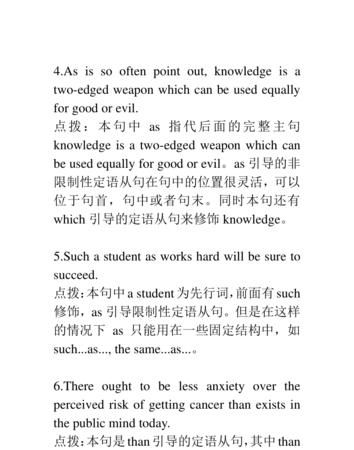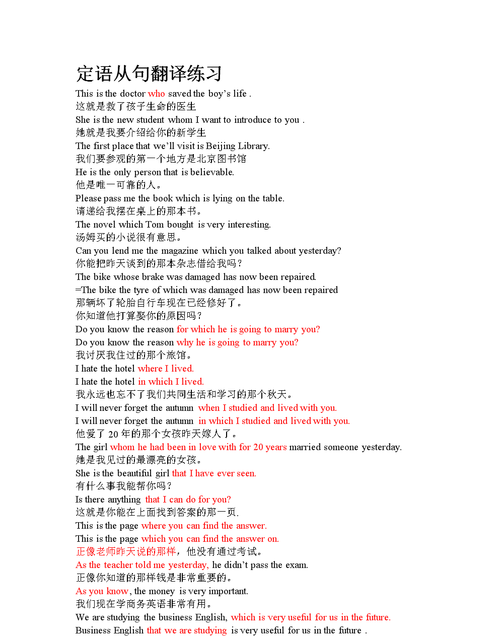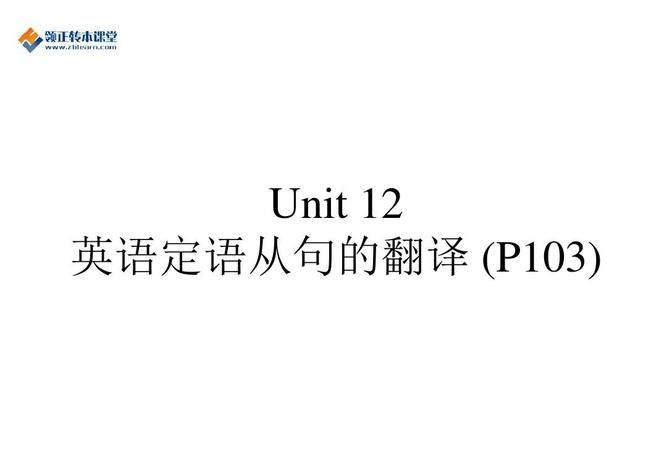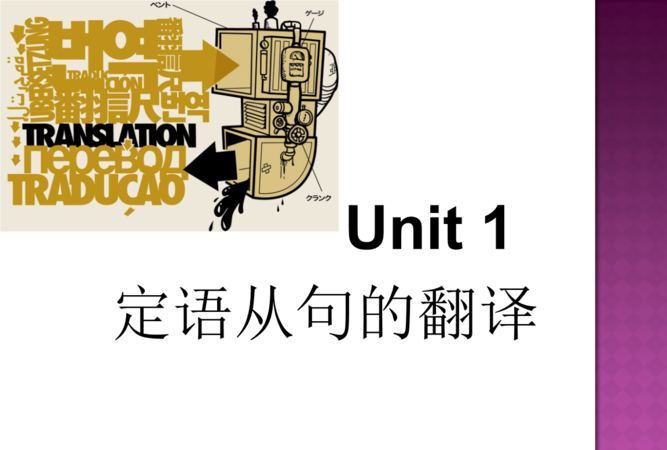本文目录
用定语从句翻译句子英文翻译
1.你昨天错过的会议非常重要.
The meeting that you have missed yesterday was very important.
2.正在做演讲的女孩是我们班的班长.
The girl who is making a speech right now is our monitor.
3.我昨天打坏的花瓶是很昂贵的.
The vase that I broke yesterday was very expensive.
4.昨天帮助了你的男孩是我的邻居.
The boy who helped you yesterday is my neighbour.
5.这正是我所感兴趣的话题.
That's just the topic that I'm very interested in.
6.这是那个给我提供了宝贵机会的老板.
He is just the boss who gave me that valueable opportunity.
7.这个话题是我感到厌倦的.
This is the topic/theme that I'm tired of.
8.他是那个帮助了我的老师.
He is the teacher who helped me.
9.我们很喜欢那个很幽默的演讲者.
We all like that speaker who is very humourous.
10.两个女儿都是教师的那个老奶奶是我们的邻居.
The old lady whose two daughters are both teachers is our neighbour.

定语从句句子翻译训练
Actions speak louder than words.
行动比言语更有说服力。(事实胜于雄辩。)
(2)Better late than never.
迟做总比不做好。
(3)Honesty is the best policy.
诚实总是上策。
(4)The best fish are / swim near the bottom.
好鱼居水底。(有价值的东西不能轻易得到。)
(5)The more you get, the more you want.
拥有越多想要越多。
(注:以上五句谚语运用了形容词、副词比较级、最高级。)
(6)A rising tide lifts all boats.
水涨众船高。
(7)Time lost cannot be recalled. (recall vt. 召回,恢复)
光阴一去不复返。
(8)To stand still is to move back.
逆水行舟,不进则退。
(9)Saving is getting.
节约而后有。(节约就是获得。)
(10)It is no use crying over spilt milk.
覆水难收。(打翻牛奶,哭也没用)
(注:以上五句运用了非谓语动词。)
(11)All work and no play makes Jack a dull boy.
只工作(学习)不玩耍,聪明孩子也变傻。
(12)Early to bed and early to rise makes a man healthy, wealthy, and wise. 早起早睡使你健康、富裕、聪明。
(13)An apple a day keeps the doctor away.
多吃水果利健康。(一天一苹果医生远离我。)
(14)Absence makes the heart grow fonder. 久别情深。
(15)Money makes the mare go. (mare n. 母马,母驴)
有钱能使鬼推磨。
(16)You may take a horse to the water, but you cannot make him drink. 领马河边易,逼马饮水难。
(不要逼人做不愿做的事。)
(注:以上六句运用了“vt. + 宾语+ 宾语补足语”。)
(17)A bird in the hand is worth two in the bush.
双鸟在林不如一鸟在手。
(18)An hour in the morning is worth two in the evening.
一日之计在于晨。
(19)Hope for the best and prepare for the worst.
抱最好的希望,作最坏的准备。
(20)It’s never too late to mend.
改过迁善从不嫌晚。(亡羊补牢,未为迟也。)
(21)One is never too old to learn. 活到老,学到老。
(22)Reading is to the mind what exercise is to the body.
阅读对于我们心灵之重要,犹如运动对于身体一样。
(注:以上六句运用了be worth…, hope for…, prepare for…, too… to…, A is to B what C is to D 固定结构)
(23)All that glitters is not gold. / All is not gold that glitters. (glitter vi. 闪光,闪烁)闪光的并非都是金子。
(24)All that dogs bark at are not thieves. / All are not thieves that dogs bark at.狗吠者未必是贼。(勿以貌取人。)
(25)Every couple is not a pair. / Not every couple is a pair. 成双未必能配对。
注:以上三句运用了部分否定结构。)
(26)It is a good horse that never stumbles, and a good wife that never grumbles. (stumble vi. 绊倒,失足 grumble vi. 发牢骚,抱怨)良马会失蹄,贤妻有牢骚。
(27)It’s a long lane that has no turning. (lane n. 小巷) 否极泰来。(路必有弯,事必有变。)(没有弯曲的路真长。)(不顺是暂时,转机定出现。)
(28)It is love that makes the world go round.
爱使世界更美好。
(29)It is the early bird that catches the worm.
早出的鸟儿吃到虫。(疾足者先得。)
(注:以上四句运用了强调句型。)
(30)A fall into the pit, a gain in your wit. (pit n. 坑,陷井 wit n. 智力,才智)
吃一堑,长一智。
(31)An eye for an eye, a tooth for a tooth.
以眼还眼,以牙还牙。
(32)Never put off till tomorrow.
今日事,今日做。(今日事,今日毕。)
(33)Once bitten, twice shy.
一朝被蛇咬,十年怕井绳。(一次上当,下次小心。)
(34)Out of sight, out of mind.
眼不见,心不想。(不见就忘。)(离久情疏。)
(35)Waste not, want not. 不浪费,不愁缺。
(注:以上六句运用了“省略”,表达精练,语言生动。)
(36)All’s well that ends well. 结果好就是一切好。
(37)He laughs best who laughs last.
谁笑在最后,谁笑得最好。
(38)Those who live in glass houses should not throw stones.
家居玻璃房,切忌乱扔石。(自己有弱点,勿揭他人短。)
(注:以上三句运用了定语从句。)
(39)Don’t count your chickens before they are hatched. (hatch vt. 孵出) 小鸡孵出前,先别忙点数。(办事尚未果,不把成功言。)(不要过早乐观。)
(40)When in Rome do as the Romans do.
身处罗马学意人,到了一地尊风俗。(入乡随俗)
(41)What’s learnt in the cradle lasts till the tomb. (cradle n. 摇蓝)
摇蓝中所学,受用到墓穴。(孩提时代学到的东西,至死不忘。)
(注:以上三句分别运用了时间状语从句、方式状语从句、主语从句。)
(42)If at first you don’t succeed, try, try, try again. 再接再厉,终会成功。
(43)If a thing is worth doing, it’s worth doing well. 凡值得一做的都值得做好。
(44)While there is life there is hope.
有生命就有希望。(留得青山在,不怕没柴烧。)
(注:以上三句运用了条件状语从句)
(45)Where there’s a will, there’s a way. 有志者事竟成。(日本丰田汽车公司曾把该谚语改为一句琅琅上口的广告:Where there’s a road, there’s a Toyota.)
(46)Where there’s smoke, there’s fire. 无风不起浪。
(注:以上两句运用了地点状语从句)
1.God helps those who help themselves.
自助者天助。
2.He who does not reach the Great Wall is not a true man.
不到长城非好汉。
3.He who laughs last laughs best.
谁笑到最后,谁笑得最好。
4.All is well that ends well.
结局好,一切都好。
5.All that glitters is not gold. All is not gold that glitters.
闪闪发光的不都是金子。
6.Nothing in the world is difficult for one who sets his mind to it.
世上无难事,只怕有心人。
Nothing is difficult to the man who will try.
世上无难事,只要肯登攀。
7.The hands that push cradles are the hands that push the world.
推动摇篮的手,就是推动世界的手。
8.He who knows others is learned, and he who knows himself is wise.
知人者智,自知者明。
9.He who loves others is constantly loved, and he who respects others is constantly respected.
爱人者人恒爱之,敬人者人恒敬之。
10.True friendship is like sound health, the value of which is seldom known until it is lost.
真正的友谊犹如健康的身体,失去时方知其可贵。
心急吃不了热豆腐。 All good things come to those who wait.
天外有天,人外有人。There is always somebody out there who is better than you
4.A good book is a best friend who never turns back upon us.好书如挚友,情谊永不变。
5.He gives twice who gives quickly.及时援助,事半功倍。
6.He who makes no mistakes makes nothing.谨小慎微,难成大器。
7.He is rich that has few wants.寡欲则富。
8.He who has a lazy hand has an empty mouth.手懒饿肚皮。
9.He who knows useful things,not many things,is wise.聪明的人不是懂得多,而是懂得有用的东西。
10.He who gains time gains all.赢得时间就赢得一切。

定语从句怎么翻译
弄清楚定语从句的结构,翻译起来就方便多了:
请看以下介绍:
That 只能用在限定性定语从句中,而who, whom, which, which 既可用于限定性定语从句中,也可用于非限定性定语从句。
I know that he is a man who means what he says.
I know that he is a man that means what he says. 【我知道他是一个守信用的人。】
The gentleman whom she met addressed her with courtesy.
The gentleman that she met addressed her with courtesy. 【她遇到的那位先生很有礼貌地向她打了招呼。】
The gentleman she met addressed her with courtesy.(在从句中充当动词宾语的关系代词,可以省略。)
The watch which was lost has been found.
The watch that was lost has been found. 【丢了的表找到了。】
Here is the material which you need. (注:现代美语中不允许这样用)
Here is the material that you need.
Here is the material you need. 【你要的材料在这儿了。】
You are the only one whose advice he might listen to. 他也就是听你的话吧。
关系副词的选用相对来说比较简单,如果先行词是表示时间的名词,如time, day 等,则用when, 如先行词为表示地点的名词,如place, house, area 等等,则选用where。如果先行词为reason 则选用why
I will never forget the mountain village where I spent my childhood.
I will never forget the mountain village in which I spent my childhood.
我永远也不会忘记我度过童年的那个小山村。
I don’t know the reason why he did that.
I don’t know the reason for which he did that. 【我不知道他为什么这么做。】
当先行词是all, something, nothing 等不定代词时,或者先行词的前面有first, last, only, few, much, some, any, no 等词修饰时,或者先行词的前面有最高级修饰时,一般只用that 而不用which 来引导定语从句:
I have explained everything that I can to you.
I have explained everything I can to you. 【我已经尽一切可能把事情向你解释得一清二楚。】
This is the most beautiful campus that I have ever been to.
This is the most beautiful campus I have ever been to. 【这是我见到的最美丽的校园。】
That’s all that I know.
That’s all I know. 【我知道的就是这些。】
Can you tell me something that you know?
Can you tell something you know? 【你能把你知道的一些情况告诉我吗?】
There is nothing that I cannot tell you.
There is nothing I cannot tell you. 【我没有什么不能告诉你的事情。】
The first thing that we should do is to work out a plan.
The first thing we should do is to work out a plan. 【我们应该做的头一件事就是订一个计划。】
The last place that we visited was the farm.
The last place we visited was the farm. 【我们最后参观的地方是农场。】
还有一种定语从句,它的结构是:the same ….. as…, such … as
这里的as 可以指人或物,这里的as 引导的是限定性定语从句:
Such furniture as is very popular is expensive. 一种很受欢迎的家具价钱昂贵。
We have successfully done the same experiment as you did. 你做过的那个试验我们已经成功地做完了。
It wasn’t such a computer as the advertisement had promised. 这种电脑可不是广告中说的那种电脑。
限定性定语从句与主句关系密切,为句中不可缺少的部分,如去掉,主句意思就不完整了。而非限定性定语从句与主句关系松散,如果去掉了,主句内容仍然完整。在书面语中非限定性定语从句一般补逗号隔开。非限定性定语从句一般不用that 引导。引导非限定性定语从句的关系词不可省略。
His speech, which bored everyone, went on and on. 他的讲话没完没了,真让人烦。
The general’s daughter, whose name is Jane, gave me a sweet smile.
将军的女儿名叫珍妮。她冲我笑了笑,笑得好甜啊。
非限定性定语从句中,先行词也可以是整个句子,一般用which 或as 来引导定语从句,which在从句中可充当主语、宾语等,as 在从句中一般只充当主语,which 与as 引导这类定语从句的区别在于:which 只能放在句子当中或句子末尾,而as 的位置比较灵活,可以放在句子当中、句子末尾,也可以放在句首。
As is known to all, too much stress can cause disease.
Too much stress can cause disease, as is known to all.
Too much stress can cause disease, which is known to all. 【众所周知,压力太大了,人会得病的。】
Water consists of hydrogen and oxygen, which is known to all.
Water consists of hydrogen and oxygen, as is known to all. 【众所周知,水是由氢和氧组成的。】
关系代词在定语从句中有时也作介词的宾语。如果介词被置于关系代词前,一般只用介词加which 或介词加whom,而不用介词加that来引导定语从句。如果介词被置于从句句末,则可以使用that来代替which或whom,这时的that可以省略。
This is the ring on which she spent 1,000 dollars. 这就是她花了一千美元买的那枚戒指。
One of my colleagues whom you are familiar with will come today.
One of my colleagues that you are familiar with will come today.
One of my colleagues you are familiar with will come today.
我的一个同事,就是你非常熟悉的那个人,今天要过来。

遇到定语从句怎么翻译
That
只能用在限定性定语从句中,而who,
whom,
which,
which
既可用于限定性定语从句中,也可用于非限定性定语从句。
I
know
that
he
is
a
man
who
means
what
he
says.
I
know
that
he
is
a
man
that
means
what
he
says.
【我知道他是一个守信用的人。】
The
gentleman
whom
she
met
addressed
her
with
courtesy.
The
gentleman
that
she
met
addressed
her
with
courtesy.
【她遇到的那位先生很有礼貌地向她打了招呼。】
The
gentleman
she
met
addressed
her
with
courtesy.(在从句中充当动词宾语的关系代词,可以省略。)
The
watch
which
was
lost
has
been
found.
The
watch
that
was
lost
has
been
found.
【丢了的表找到了。】
Here
is
the
material
which
you
need.
(注:现代美语中不允许这样用)
Here
is
the
material
that
you
need.
Here
is
the
material
you
need.
【你要的材料在这儿了。】
You
are
the
only
one
whose
advice
he
might
listen
to.
他也就是听你的话吧。
关系副词的选用相对来说比较简单,如果先行词是表示时间的名词,如time,
day
等,则用when,
如先行词为表示地点的名词,如place,
house,
area
等等,则选用where。如果先行词为reason
则选用why
I
will
never
forget
the
mountain
village
where
I
spent
my
childhood.
I
will
never
forget
the
mountain
village
in
which
I
spent
my
childhood.
我永远也不会忘记我度过童年的那个小山村。
I
don’t
know
the
reason
why
he
did
that.
I
don’t
know
the
reason
for
which
he
did
that.
【我不知道他为什么这么做。】
当先行词是all,
something,
nothing
等不定代词时,或者先行词的前面有first,
last,
only,
few,
much,
some,
any,
no
等词修饰时,或者先行词的前面有最高级修饰时,一般只用that
而不用which
来引导定语从句:
I
have
explained
everything
that
I
can
to
you.
I
have
explained
everything
I
can
to
you.
【我已经尽一切可能把事情向你解释得一清二楚。】
This
is
the
most
beautiful
campus
that
I
have
ever
been
to.
This
is
the
most
beautiful
campus
I
have
ever
been
to.
【这是我见到的最美丽的校园。】
That’s
all
that
I
know.
That’s
all
I
know.
【我知道的就是这些。】
Can
you
tell
me
something
that
you
know?
Can
you
tell
something
you
know?
【你能把你知道的一些情况告诉我吗?】
There
is
nothing
that
I
cannot
tell
you.
There
is
nothing
I
cannot
tell
you.
【我没有什么不能告诉你的事情。】
The
first
thing
that
we
should
do
is
to
work
out
a
plan.
The
first
thing
we
should
do
is
to
work
out
a
plan.
【我们应该做的头一件事就是订一个计划。】
The
last
place
that
we
visited
was
the
farm.
The
last
place
we
visited
was
the
farm.
【我们最后参观的地方是农场。】
还有一种定语从句,它的结构是:the
same
…..
as…,
such
…
as
这里的as
可以指人或物,这里的as
引导的是限定性定语从句:
Such
furniture
as
is
very
popular
is
expensive.
一种很受欢迎的家具价钱昂贵。
We
have
successfully
done
the
same
experiment
as
you
did.
你做过的那个试验我们已经成功地做完了。
It
wasn’t
such
a
computer
as
the
advertisement
had
promised.
这种电脑可不是广告中说的那种电脑。
限定性定语从句与主句关系密切,为句中不可缺少的部分,如去掉,主句意思就不完整了。而非限定性定语从句与主句关系松散,如果去掉了,主句内容仍然完整。在书面语中非限定性定语从句一般补逗号隔开。非限定性定语从句一般不用that
引导。引导非限定性定语从句的关系词不可省略。
His
speech,
which
bored
everyone,
went
on
and
on.
他的讲话没完没了,真让人烦。
The
general’s
daughter,
whose
name
is
Jane,
gave
me
a
sweet
smile.
将军的女儿名叫珍妮。她冲我笑了笑,笑得好甜啊。
非限定性定语从句中,先行词也可以是整个句子,一般用which
或as
来引导定语从句,which在从句中可充当主语、宾语等,as
在从句中一般只充当主语,which
与as
引导这类定语从句的区别在于:which
只能放在句子当中或句子末尾,而as
的位置比较灵活,可以放在句子当中、句子末尾,也可以放在句首。
As
is
known
to
all,
too
much
stress
can
cause
disease.
Too
much
stress
can
cause
disease,
as
is
known
to
all.
Too
much
stress
can
cause
disease,
which
is
known
to
all.
【众所周知,压力太大了,人会得病的。】
Water
consists
of
hydrogen
and
oxygen,
which
is
known
to
all.
Water
consists
of
hydrogen
and
oxygen,
as
is
known
to
all.
【众所周知,水是由氢和氧组成的。】
关系代词在定语从句中有时也作介词的宾语。如果介词被置于关系代词前,一般只用介词加which
或介词加whom,而不用介词加that来引导定语从句。如果介词被置于从句句末,则可以使用that来代替which或whom,这时的that可以省略。
This
is
the
ring
on
which
she
spent
1,000
dollars.
这就是她花了一千美元买的那枚戒指。
One
of
my
colleagues
whom
you
are
familiar
with
will
come
today.
One
of
my
colleagues
that
you
are
familiar
with
will
come
today.
One
of
my
colleagues
you
are
familiar
with
will
come
today.

以上就是关于定语从句书面表达的句子翻译 ,用定语从句翻译句子英文翻译的全部内容,以及定语从句书面表达的句子翻译 的相关内容,希望能够帮到您。
